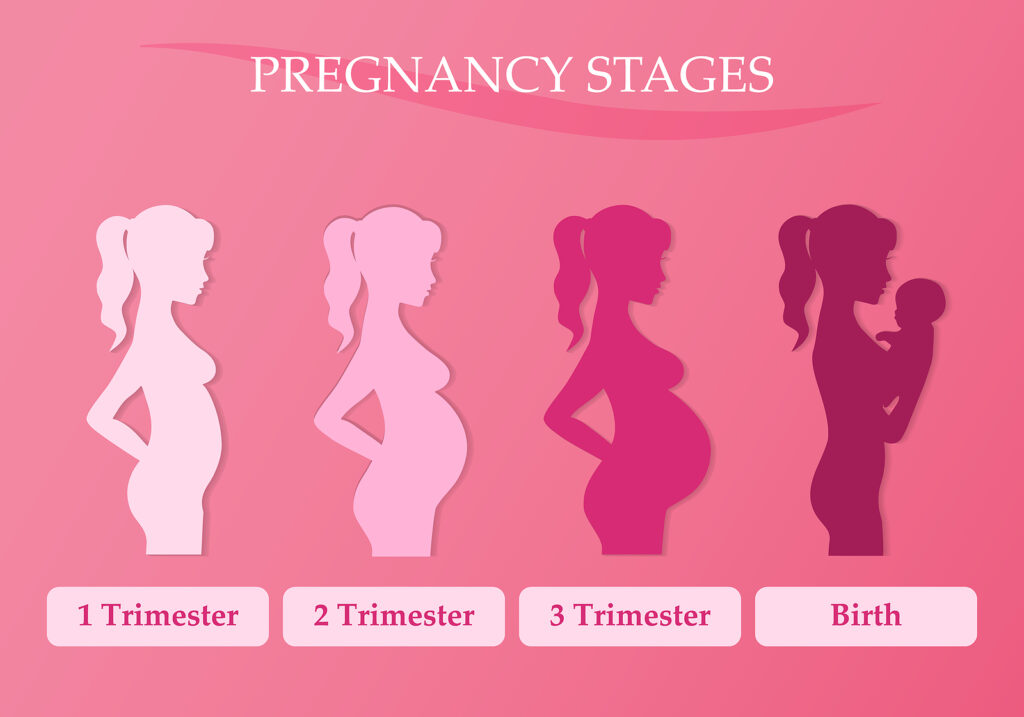
Congratulations! Pregnancy is both exciting and unique to each woman. It inspires expecting women to make healthier lifestyle choices. The first three months of pregnancy is called the “first trimester”; it’s a time when your baby is making a foundation for a sustainable life. It’s also a time when your body is making big changes to accommodate your baby’s birth. Here is information on the first trimester and what you can typically expect.
What Is the First Trimester?
A healthy pregnancy lasts for a maximum of 40 weeks. The weeks are spanned into three trimesters. The first trimester is the time between fertilization of the egg by the sperm, i.e., conception, and week 12 of the pregnancy. (Cafasso, 2017)
In the first trimester, the body releases hormones that affect almost every single organ in the body. The first sign you may be pregnant is missing a period.
Understanding the development week by week can help pregnant women make informed decisions and prepare for the significant changes that lie ahead. The baby in your womb is relying on you for its health and wellness. Your primary focus should be staying healthy and working with your doctor to give your baby a healthy start in life and your peace of mind.
Here are five critical tips on modifying your eating habits and physical activity while you’re in your first trimester.
Gain Healthy Weight
It’s essential to gain weight slowly. The old myth that you’re ‘eating for two’ is just that, a myth. During the first trimester, your baby is only the size of a walnut and doesn’t need any extra calories. The rate of weight gain, in usual cases, should be between 1 to 4 pounds in the first three months.
Speak to your medical professional about how much weight gain is appropriate for you. Don’t forget to take into account your age, current weight, and health. Track your weight at home between visits to your health care professional.
Some women may lose a small amount of weight at the start of their pregnancy. Don’t get stressed; it’s best to speak to your OB/Gyn if it happens and gives you concern.
Eat Nutritional Food
If you’re at a healthy weight, the Centers for Disease Control and Prevention (CDC) says you need no extra calories in your first trimester.
However, a healthy eating plan for pregnancy includes nutrient-rich foods and beverages. The 2015–2020 Dietary Guidelines for Americans recommends these foods and drinks each day:
- Fruits and vegetables (provide vitamins and fiber)
- Whole grains, such as oatmeal, whole-grain bread, and brown rice (provide fiber, B vitamins, and other needed nutrients)
- Fat-free or low-fat milk and milk products or non-dairy soy, almond, rice, or other drinks with added calcium and vitamin D
- Protein from healthy sources, such as beans and peas, eggs, lean meats, seafood that is low in mercury (up to 12 ounces per week), and unsalted nuts and seeds, if you can tolerate them and aren’t allergic to them.
A healthy eating plan also limits salt, solid fats such as butter, lard, shortening, and sugar-sweetened drinks and foods. (NIDDK, 2019)
Take Prenatal Vitamins as Prescribed
It’s vital to take your prenatal vitamins every day to keep you healthy and your baby’s optimal growth. Your body needs more iron because you’re producing extra blood for your baby. The iron in the prenatal vitamin helps you carry oxygen to your baby’s blood. You’ll also take folic acid which helps prevent severe congenital disabilities of the brain and spinal cord. (Mayo Clinic, 2019)
A vitamin supplement isn’t a replacement for your healthy diet; however, most pregnant women need to take a prenatal vitamin to make sure they get appropriate levels of these minerals. Your OB/Gyn will check your current levels with bloodwork and prescribe supplements accordingly.
Exercise Is Important
During the first trimester, aim to establish good exercise habits. The right amount of exercise will depend on how active a person was before becoming pregnant. Women can start with low-intensity workouts such as walking, yoga, swimming, and water aerobics. You can also add slightly more vigorous exercises in your initial weeks like running, jogging, and moderate weightlifting.
While the benefits generally outweigh the risks, don’t forget to speak with your medical professional before starting any new exercises or workout routines. Take frequent breaks, drink plenty of fluids, avoid working out in extreme heat or humidity, and don’t overdo it.
Stay Hydrated
When you’re pregnant, you need more water than the average person to form amniotic fluid, produce extra blood, build new tissue, carry nutrients, enhance digestion, and flush out wastes and toxins. It’s crucial even more during the hot summer months.
Your body can be slightly dehydrated after six to eight hours of night sleep. You can’t prevent this from happening, but you can reduce dehydration and its impact on your body.
Medical experts advise drinking at least 8 cups of water every day- two cups first thing in the morning and another two cups with lunch and dinner. In between, carry a water bottle and sip from it throughout the day.
Your Doctor and You
Pregnancy and prenatal health both run parallelly. During the first trimester, prenatal care includes blood tests, a physical exam, conversations about lifestyle, and more. Early and regular prenatal visits help your doctor to monitor your health and your baby’s health.
Your first visit is an ideal time to go over your medical history and talk about risk factors or concerns related to your pregnancy. Explain any sensitive issues you may have faced, such as abortion or any miscarriage, past drug use, allergies, etc. It will help your health care provider take the best care of you and your baby.
There are even genetic tests that can be ordered for expecting moms who have certain congenital or chronic illnesses in themselves or in family members. Providing your doctor with information about a condition ahead of time helps your baby transition to the best possible health from the first minute of life on.
There has never been a time when expecting a child has had so many options for knowing information and preventing complications with prenatal technology. Your baby’s first trimester start is a time for anticipation, gender reveals, and planning and healthcare vigilance that protects your health as well. Staying vigilant on these points will help you manage with the wonders of new life and it grows within you.
Works Cited
NIDDK, N. (2019, October 01). Health Tips for Pregnant Women. Retrieved November 18, 2020, from https://www.niddk.nih.gov/health-information/weight-management/healthy-eating-physical-activity-for-life/health-tips-for-pregnant-women
Prevent Iron Deficiency Anemia during Pregnancy. 25 Oct. 2019, www.mayoclinic.org/healthy-lifestyle/pregnancy-week-by-week/in-depth/anemia-during-pregnancy/art-20114455.
Cafasso, J. (2017, November 08). The First Trimester of Pregnancy. Retrieved November 18, 2020, from https://www.healthline.com/health/pregnancy/first-trimester
















